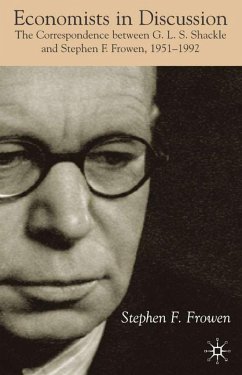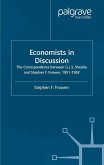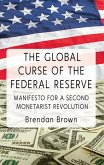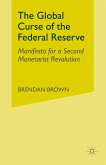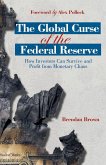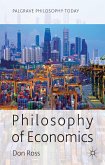This volume contains the correspondence between G.L.S. Shackle and S.F. Frowen from the time Shackle took up his first post-war academic appointment until his death in 1992. The correspondence, partly personal and partly professional, reveals a vital insight into Shackle both as a man and as an outstanding economist. His letters illuminate his thoughts on issues occupying his mind but also show the warmth and tremendous generosity he felt towards his friends. The centenary of Shackle's birth in 2003 seems an appropriate time for the publication of his letters.
Hinweis: Dieser Artikel kann nur an eine deutsche Lieferadresse ausgeliefert werden.
Hinweis: Dieser Artikel kann nur an eine deutsche Lieferadresse ausgeliefert werden.
'These letters tell an intimate personal story of a developing friendship, with glimpses of the delights of childhood and the tragedies of death; of the day-to-day problems and satisfactions during 40 years of academic life; of the hopes, frustrations and achievements of Stephen Frowen's advancing career; and of George Shackle's generosity and vision expressed in his own inimitable style.' - Stephen C. Littlechild, Honorary Professor, University of Birmingham
'Failure to appreciate G.L.S. Shackle's tying of human imagination to the traditional Swedish 'Wicksellian discovery' of time-analysis with the problems of dealing with unknowledge (i.e. the unknowable future) stands out as one of the Swedish Academy's lost opportunities - possibly because a genuine modesty all but hid Shackle's sparkling personality. This forty-plus years of letters' exchange with Stephen Frowen, a gifted German post-WWII émigré-turned English academic, illuminates in magnificent prose the depth of Shackle's humanity. Just as Jane Austen's novels recorded both the manners and the aspirations of an Age, so this collection stands exempler of that most unusual of modern phenomena, a brilliant scholar, confident of his own worth, and happily indifferent to (although also appreciative of) personal recognition. How generous (and euphonious) was Shackle's recognition of the potential of a brilliant and mature monetary economist. For those who cannot imagine genius and modesty combined,possession of this collection is a must.' - Mark Perlman, Professor of Economics Emeritus, University of Pittsburgh
'What may surprise readers is the extraordinary politeness of this correspondence...Colleagues they admire are warmly praised by name, but those whose ideas they deplore appear only as a category. This is not the traditionally ferocious academic world of backstabbing and intrigue. It is a world of gratitude, of courtesy, of mutual admiration. Those readers who prefer debunking to praise, horrid revelations to reticence, may find these letters quaint... But they will be read by fellow economists as a bird's eye view of structure and development in the economics departments of British universities in the 1950s, 60s and 70s, and they, and a more general readership, will enjoy this account of a friendship of unfeigned sincerity between two brilliant men of goodwill.' - Alethea Hayter, Times Literary Supplement
'Frowen's unusual and fascinating book presents forty years of correspondence between the great Austro-Keynesian theorist George Shackle (1903-1992) and the eminent monetary economist Stephen Frowen (b. 1923)...There are few books like this one. Scholarly editions of economists' letters are not uncommon, but they are rarely devoted entirely to the relationship between two authors over several decades...I hope that the sales of the Shackle-Frowen volume are sufficient to encourage further ventures of this sort. It is a well-produced and (relatively) inexpensive book, and belongs in every serious academic library.' - J.E. King, History of Economics Review
'The value of this collection [of letters] lies in the way in which it documents the relationship between two very different scholars, Frowen, his protegé, himself an economist of no small repute, and Shackle, the shy and urbane academic whose selflessness and brilliance shines through here as it does in his many published works...These letters highlight in a way that could not be captured otherwise the evolution of relationships which became profound and lasting, personal as well as professional.' - C.R. McCann Jr, History of Economic Ideas
'The book offers something that has become rare and further endangered in a world marked by communication technology inimical to style, namely letters suffused with human aspiration and the personal concerns of the two correspondents, but which at the same time are documents casting light on the period covered, and on its academic context, while step by step showing the emergence of a deep relationship - carried out in style, informative in content, and providing mental stimulation for the reader.' - Norbert Kloten, Ekonomia (Journal of the Cyprus Economic Society)
'it remains for me to recommend this book, which...is enormously rich, and its teaching may be discovered as important among the minutiae of daily life. ' - Ricardo F. Crespo, Journal of Markets and Morality
''These letters tell an intimate personal story of a developing friendship, with glimpses of the delights of childhood and the tragedies of death; of the day-to-day problems and satisfactions during 40 years of academic life; of the hopes, frustrations and achievements of Stephen Frowen's advancing career; and of George Shackle's generosity and vision expressed in his own inimitable style.' - Stephen C. Littlechild, Honorary Professor, University of Birmingham'Failure to appreciate G.L.S. Shackle's tying of human imagination to the traditional Swedish 'Wicksellian discovery' of time-analysis with the problems of dealing with unknowledge (i.e. the unknowable future) stands out as one of the Swedish Academy's lost opportunities - possibly because a genuine modesty all but hid Shackle's sparkling personality. This forty-plus years of letters' exchange with Stephen Frowen, a gifted German post-WWII émigré-turned English academic, illuminates in magnificent prose the depth of Shackle's humanity. Just as Jane Austen's novels recorded both the manners and the aspirations of an Age, so this collection stands exempler of that most unusual of modern phenomena, a brilliant scholar, confident of his own worth, and happily indifferent to (although also appreciative of) personal recognition. How generous (and euphonious) was Shackle's recognition of the potential of a brilliant and mature monetary economist. For those who cannot imagine genius and modesty combined, possession of this collection is a must.' - Mark Perlman, Professor of Economics Emeritus, University of Pittsburgh'What may surprise readers is the extraordinary politeness of this correspondence...Colleagues they admire are warmly praised by name, but those whose ideas they deplore appear only as a category. This is not the traditionally ferocious academic world of backstabbing and intrigue. It is a world of gratitude, of courtesy, of mutual admiration. Those readers who prefer debunking to praise, horrid revelations to reticence, may find these letters quaint... But they will be read by fellow economists as a bird's eye view of structure and development in the economics departments of British universities in the 1950s, 60s and 70s, and they, and a more general readership, will enjoy this account of a friendship of unfeigned sincerity between two brilliant men of goodwill.' - Alethea Hayter, Times Literary Supplement'Frowen's unusual and fascinating book presents forty years of correspondence between the great Austro-Keynesian theorist George Shackle (1903-1992) and the eminent monetary economist Stephen Frowen (b. 1923)...There are few books like this one. Scholarly editions of economists' letters are not uncommon, but they are rarely devoted entirely to the relationship between two authors over several decades...I hope that the sales of the Shackle-Frowen volume are sufficient to encourage further ventures of this sort. It is a well-produced and (relatively) inexpensive book, and belongs in every serious academic library.' - J.E. King, History of Economics Review'The value of this collection [of letters] lies in the way in which it documents the relationship between two very different scholars, Frowen, his protegé, himself an economist of no small repute, and Shackle, the shy and urbane academic whose selflessness and brilliance shines through here as it does in his many published works...These letters highlight in a way that could not be captured otherwise the evolution of relationships which became profound and lasting, personal as well as professional.' - C.R. McCann Jr, History of Economic Ideas'The book offers something that has become rare and further endangered in a world marked by communication technology inimical to style, namely letters suffused with human aspiration and the personal concerns of the two correspondents, but which at the same time are documents
'Failure to appreciate G.L.S. Shackle's tying of human imagination to the traditional Swedish 'Wicksellian discovery' of time-analysis with the problems of dealing with unknowledge (i.e. the unknowable future) stands out as one of the Swedish Academy's lost opportunities - possibly because a genuine modesty all but hid Shackle's sparkling personality. This forty-plus years of letters' exchange with Stephen Frowen, a gifted German post-WWII émigré-turned English academic, illuminates in magnificent prose the depth of Shackle's humanity. Just as Jane Austen's novels recorded both the manners and the aspirations of an Age, so this collection stands exempler of that most unusual of modern phenomena, a brilliant scholar, confident of his own worth, and happily indifferent to (although also appreciative of) personal recognition. How generous (and euphonious) was Shackle's recognition of the potential of a brilliant and mature monetary economist. For those who cannot imagine genius and modesty combined,possession of this collection is a must.' - Mark Perlman, Professor of Economics Emeritus, University of Pittsburgh
'What may surprise readers is the extraordinary politeness of this correspondence...Colleagues they admire are warmly praised by name, but those whose ideas they deplore appear only as a category. This is not the traditionally ferocious academic world of backstabbing and intrigue. It is a world of gratitude, of courtesy, of mutual admiration. Those readers who prefer debunking to praise, horrid revelations to reticence, may find these letters quaint... But they will be read by fellow economists as a bird's eye view of structure and development in the economics departments of British universities in the 1950s, 60s and 70s, and they, and a more general readership, will enjoy this account of a friendship of unfeigned sincerity between two brilliant men of goodwill.' - Alethea Hayter, Times Literary Supplement
'Frowen's unusual and fascinating book presents forty years of correspondence between the great Austro-Keynesian theorist George Shackle (1903-1992) and the eminent monetary economist Stephen Frowen (b. 1923)...There are few books like this one. Scholarly editions of economists' letters are not uncommon, but they are rarely devoted entirely to the relationship between two authors over several decades...I hope that the sales of the Shackle-Frowen volume are sufficient to encourage further ventures of this sort. It is a well-produced and (relatively) inexpensive book, and belongs in every serious academic library.' - J.E. King, History of Economics Review
'The value of this collection [of letters] lies in the way in which it documents the relationship between two very different scholars, Frowen, his protegé, himself an economist of no small repute, and Shackle, the shy and urbane academic whose selflessness and brilliance shines through here as it does in his many published works...These letters highlight in a way that could not be captured otherwise the evolution of relationships which became profound and lasting, personal as well as professional.' - C.R. McCann Jr, History of Economic Ideas
'The book offers something that has become rare and further endangered in a world marked by communication technology inimical to style, namely letters suffused with human aspiration and the personal concerns of the two correspondents, but which at the same time are documents casting light on the period covered, and on its academic context, while step by step showing the emergence of a deep relationship - carried out in style, informative in content, and providing mental stimulation for the reader.' - Norbert Kloten, Ekonomia (Journal of the Cyprus Economic Society)
'it remains for me to recommend this book, which...is enormously rich, and its teaching may be discovered as important among the minutiae of daily life. ' - Ricardo F. Crespo, Journal of Markets and Morality
''These letters tell an intimate personal story of a developing friendship, with glimpses of the delights of childhood and the tragedies of death; of the day-to-day problems and satisfactions during 40 years of academic life; of the hopes, frustrations and achievements of Stephen Frowen's advancing career; and of George Shackle's generosity and vision expressed in his own inimitable style.' - Stephen C. Littlechild, Honorary Professor, University of Birmingham'Failure to appreciate G.L.S. Shackle's tying of human imagination to the traditional Swedish 'Wicksellian discovery' of time-analysis with the problems of dealing with unknowledge (i.e. the unknowable future) stands out as one of the Swedish Academy's lost opportunities - possibly because a genuine modesty all but hid Shackle's sparkling personality. This forty-plus years of letters' exchange with Stephen Frowen, a gifted German post-WWII émigré-turned English academic, illuminates in magnificent prose the depth of Shackle's humanity. Just as Jane Austen's novels recorded both the manners and the aspirations of an Age, so this collection stands exempler of that most unusual of modern phenomena, a brilliant scholar, confident of his own worth, and happily indifferent to (although also appreciative of) personal recognition. How generous (and euphonious) was Shackle's recognition of the potential of a brilliant and mature monetary economist. For those who cannot imagine genius and modesty combined, possession of this collection is a must.' - Mark Perlman, Professor of Economics Emeritus, University of Pittsburgh'What may surprise readers is the extraordinary politeness of this correspondence...Colleagues they admire are warmly praised by name, but those whose ideas they deplore appear only as a category. This is not the traditionally ferocious academic world of backstabbing and intrigue. It is a world of gratitude, of courtesy, of mutual admiration. Those readers who prefer debunking to praise, horrid revelations to reticence, may find these letters quaint... But they will be read by fellow economists as a bird's eye view of structure and development in the economics departments of British universities in the 1950s, 60s and 70s, and they, and a more general readership, will enjoy this account of a friendship of unfeigned sincerity between two brilliant men of goodwill.' - Alethea Hayter, Times Literary Supplement'Frowen's unusual and fascinating book presents forty years of correspondence between the great Austro-Keynesian theorist George Shackle (1903-1992) and the eminent monetary economist Stephen Frowen (b. 1923)...There are few books like this one. Scholarly editions of economists' letters are not uncommon, but they are rarely devoted entirely to the relationship between two authors over several decades...I hope that the sales of the Shackle-Frowen volume are sufficient to encourage further ventures of this sort. It is a well-produced and (relatively) inexpensive book, and belongs in every serious academic library.' - J.E. King, History of Economics Review'The value of this collection [of letters] lies in the way in which it documents the relationship between two very different scholars, Frowen, his protegé, himself an economist of no small repute, and Shackle, the shy and urbane academic whose selflessness and brilliance shines through here as it does in his many published works...These letters highlight in a way that could not be captured otherwise the evolution of relationships which became profound and lasting, personal as well as professional.' - C.R. McCann Jr, History of Economic Ideas'The book offers something that has become rare and further endangered in a world marked by communication technology inimical to style, namely letters suffused with human aspiration and the personal concerns of the two correspondents, but which at the same time are documents

